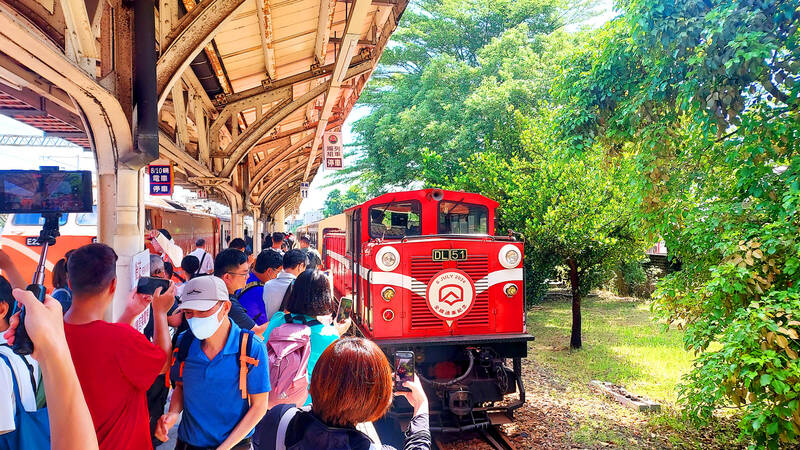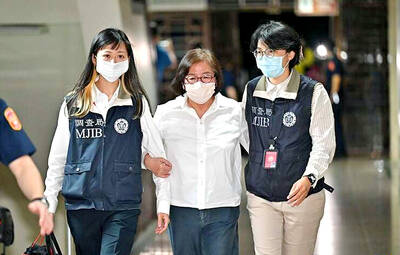After 15 years of disruptions caused by two devastating typhoons, the Alishan Forest Railway resumed full operations yesterday, with 85 passengers on board the first train from Chiayi to Alishan, a popular tourist attraction in southern Taiwan.
There would be four trains running daily on different sections of the 71.6km Alishan main line, with the full fare from Chiayi to Alishan stations costing NT$600, the Alishan Forest Railway and Cultural Heritage Office said.
Parts of the railway had been closed since 2009 due to the route being damaged in more than 421 places by Typhoon Morakot, the line’s operator said.

Photo: Lin Yi-chang, Taipei Times
Travel between Chiayi and Fenqihu stations resumed in 2014, while the rest of the line, originally set to reopen shortly afterward, was delayed again when Typhoon Dujuan struck in 2015.
While some repairs were made in the following years, the line, which traces its history back to 1912 under Japanese rule, remained operational only between Chiayi and Shizilu stations.
To restore connectivity, the office spent NT$420 million (US$12.95 million) in 2021 to build a 1.1km long tunnel in the typhoon-struck area between Shizilu and Zhaoping stations.

Photo: Tsai Tsung-hsun, Taipei Times
The three-year project was full of challenges, construction site director Lee Chi-kuan (李致寬) said.
In addition to constant water surges and rockfalls, the workers experienced extreme mental strain because the round-the-clock tunnel excavation work required them to operate in complete darkness, Lee said.
Other incidents such as the COVID-19 outbreak and the Russian-Ukraine war — which led to shortages of workers and explosives, respectively — also affected the construction schedule, Lee said.
Several stations underwent renovations as part of the overhaul of the railway, including Zhuqi, the final stop on the railway’s flat stretch.
Painted in tiffany blue and designated a county historical site, the station uses Alishan cypresses for the wooden frame, while the walls showcase the distinctive “wattle and daub,” a traditional construction method in Taiwan, Lee said.
New safety measures are also being implemented on the line, including the installation of systems to detect objects on the tracks and unstable slopes, the office said.
An automatic incident detection system was installed between tunnels No. 29 and No. 30 because the short distance between them provides drivers with relatively insufficient time to react in the event of an incident, said Lien Hsiang-yi (連祥益) from the office’s Railway Service Division.
Should rocks or trees obstruct the tracks, the system would flash warnings before the train enters the affected area and send messages to train station staff members so they can notify the drivers, Lien said.
To attract visitors, the office has introduced two new tourist charter trains, the Vivid Express and Formosensis, featuring luxurious interior designs and large windows for a refreshing travel experience.
The former, which was launched on May 24, features private box cars and seats that can rotate 360 degrees, the office said.
Formosensis is to start operation on July 28, featuring cypress carriages, metal window frames and arched ceilings, it said.
Despite evolving missions over time — from transporting timber a century ago to boosting tourism today — the railway has continuously shaped the lifestyle of Chiayi residents.
It is hoped that the full railway service and various tour packages would not only create a rich travel experience, but also showcase the abundant scenic views along the route, office director Huang Miao-hsiu (黃妙修) said.
“We hope the railway could introduce the beauty of Alishan to the world,” she said.

Costa Rica sent a group of intelligence officials to Taiwan for a short-term training program, the first time the Central American country has done so since the countries ended official diplomatic relations in 2007, a Costa Rican media outlet reported last week. Five officials from the Costa Rican Directorate of Intelligence and Security last month spent 23 days in Taipei undergoing a series of training sessions focused on national security, La Nacion reported on Friday, quoting unnamed sources. The Costa Rican government has not confirmed the report. The Chinese embassy in Costa Rica protested the news, saying in a statement issued the same

Taiwan is to extend its visa-waiver program for Philippine passport holders for another year, starting on Aug. 1, Minister of Foreign Affairs Lin Chia-lung (林佳龍) said on Friday. Lin made the announcement during a reception in Taipei marking the 127th anniversary of Philippine independence and the 50th anniversary of the establishment of the Manila Economic and Cultural Office (MECO) in Taiwan, the Ministry of Foreign Affairs said. The decision reflected Taiwan’s commitment to deepening exchanges with the Philippines, the statement cited Lin as saying, adding that it was a key partner under the New Southbound Policy launched in 2016. Lin also expressed hope

Temperatures in New Taipei City’s Sindian District (新店) climbed past 37°C yesterday, as the Central Weather Administration (CWA) issued heat alerts for 16 municipalities, warning the public of intense heat expected across Taiwan. The hottest location in Taiwan was in Sindian, where the mercury reached 37.5°C at about 2pm, according to CWA data. Taipei’s Shilin District (士林) recorded a temperature of 37.4°C at noon, Taitung County’s Jinfeng Township (金峰) at 12:50 pm logged a temperature of 37.4°C and Miaoli County’s Toufen Township (頭份) reached 36.7°C at 11:40am, the CWA said. The weather agency yesterday issued a yellow level information notice for Taipei, New

CASE: Prosecutors have requested heavy sentences, citing a lack of remorse and the defendants’ role in ‘undermining the country’s democratic foundations’ Five people affiliated with the Chinese Nationalist Party (KMT), including senior staff from the party’s Taipei branch, were indicted yesterday for allegedly forging thousands of signatures to recall two Democratic Progressive Party (DPP) lawmakers. Those indicted include KMT Taipei chapter director Huang Lu Chin-ru (黃呂錦茹), secretary-general Chu Wen-ching (初文卿) and secretary Yao Fu-wen (姚富文), the Taipei District Prosecutors’ Office said in a news release. Prosecutors said the three were responsible for fabricating 5,211 signature forms — 2,537 related to the recall of DPP Legislator Wu Pei-yi (吳沛憶) and 2,674 for DPP Legislator Rosalia Wu (吳思瑤) — with forged entries accounting for